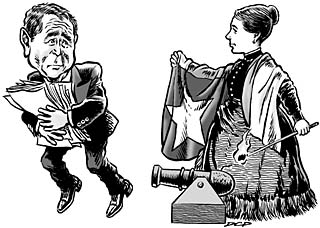W.'s Paper Chase
Bush Attempts to Have His State Papers Declared Federal Property
By Lucius Lomax, Fri., Sept. 28, 2001

In January, while the eyes of the world were on recounts in Florida and the never-ending U.S. presidential election, a convoy of trucks left the state Capitol complex in Austin. The trucks were on a 110-mile trip to the southeast, to College Station and Texas A&M University -- specifically, to the George Bush Presidential Library on the A&M campus. Carrying 60 shrink-wrapped pallets of documents, the convoy was removing Gov. George W. Bush's gubernatorial records from direct state control and passing them into the hands of federal archivists, already working to catalog the papers of the elder Bush's government service.
The move was not remarked upon or apparently even announced in Austin. But as early as 1997, the younger Bush had made clear his intention to store his gubernatorial records at the library devoted to his father's government service, instead of at the state archives in Austin. Frustrated at first by a Texas law that would have in theory barred him from housing his papers at the presidential library at A&M (a federal facility, managed by the National Archives and Records Administration), Gov. George W. Bush had successfully sought state legislation which would allow him to "designate an institution of higher education or alternate archival institution in the state, in lieu of the Texas State Library and Archives, as the repository for the records of the executive office of the governor."
But what began in 1997 as an effort by the then-governor simply to house his public papers with those of his father has, step by step -- with some assistance from the current occupant of the Governor's Mansion -- led to a legal struggle conducted behind closed doors. The final outcome, intended or not, may be to keep the record of George W. Bush's six-year term in Austin out of reach of historians and journalists -- and the public -- at least until Bush's term in the White House ends, and perhaps longer.
"There is some doubt about who has ownership [of the Bush documents] now," State Archivist Chris LaPlante told the State Library Commission at a meeting earlier this year, in which the impasse between the state and federal governments was discussed. (The discussions are available to the public on audiotape.) "And because of the difficulty of accessing these records, it's entirely possible that at some point, someone could take legal action under the Texas Public Information Act for failure of the Bush Library to provide the information that one has requested, in accordance with the Public Information Act. Of course on their hand, [the archival staff of the Bush Library] is saying 'That's a state law, that doesn't apply to us.' They're only liable for the Freedom of Information Act, a federal law. It's really important that this issue be resolved."
George W. Bush is not the first former Texas governor to consign his papers to a repository other than the state archives. John Connally, for example, left his papers to the Lyndon Baines Johnson Presidential Library at UT. Bill Clements' archives are also at A&M, although not housed in the federal archives. But a crucial difference separates these past cases from what President Bush is now attempting to do. The state of Texas retained title to the official papers of Connally and Clements, and the State Library and Archives kept copies of the documents as well. In the case of the Bush papers, state archivists have never been permitted even to sort through the complete documents, or arrange or classify them. President Bush's private attorney, supported by Gov. Perry's office, is apparently now taking the position that the records no longer belong to the state.
State archivists have offered to catalog the records for the Bush Library either at College Station or during a temporary return to Austin. "I think we have more agreement with the National Archives and Records Administration than we do with other units of state government," said one State Library official, alluding to the difference of opinion between the state agency and Gov. Perry. "We can deal with [NARA] as archival professionals, and they know the kind of work that needs to be done. They know they can't do it. They know they're not responsible for doing that kind of work on records that are not federal records of the presidential library that they're serving. Our offer I think [is] very generous."
A member of the State Library Commission (the six-member board that oversees the archives and the State Library, which includes the whole trove of official Texas writings beginning even before the Revolution) commented: "The fact that we're requesting [the records] come back here for the inventory process would not undo the spirit of what [President Bush] wants, and that's the end result for them to be placed with his father's material. So what's the conflict?"
Gov. Perry Abdicates
"In December of last year," state archivist LaPlante explained in May to the board of the State Library and Archives Commission, "the state librarian, Peggy Rudd, received a phone call -- December 19, I think -- from a staff member in Governor Bush's general counsel's office saying that they were going to walk over for her signature a formal agreement that had been signed by Gov. Bush, in which he officially designated the Bush Library as the official alternative repository for the records of his administration." At that time the state librarian declined to sign a full agreement with the president-elect. "We simply didn't know much about what was in the records. We had not seen a 'finding aid': an inventory of the records," one library official said. The state archivists did, however, respond with a suggested memorandum of understanding of their own that required "shipping those records back here to Austin, from College Station, so that we can do a preliminary inventory. That version has been provided to and is currently being reviewed by staff at the National Archives, the governor's general counsel's office, [and] President Bush's personal attorney. Some issues did arise [that is, there were some differences between the parties]."
In the spring, an attempt at a conference-call resolution by all the parties to resolve those issues was unsuccessful. One state official who took part in the call noted an odd position taken at the start by Gov. Perry's representatives. "When Governor Perry's office participated in the conference call, they right at the beginning made it clear that they did not consider themselves in any way responsible for the records, and they weren't sure why they were in the conference call, but they were." Perry's indecisive state then changed. "An issue involved whether [the Bush gubernatorial papers] were state records or federal records," the same official said, "and we thought we were in pretty much agreement that they were state records. The national archives indicated that they had no problem with them being state records. They didn't consider them federal records. But then after the [proposed] memorandum of understanding was circulated, the governor's office, in conversations with the attorney general's office -- they didn't speak directly to us -- [came to the conclusion that the 1997 statute signed into law by then-governor Bush] was some kind of trump card that gave the governor [Bush] wide-ranging authority to redesignate the records from being state records to being something else."
Further attempts to pursue an agreement by telephone were quashed by Perry's office. "We were going to have a second conference call," said a State Library official who participated in the first, "but that got sidetracked when the governor's office felt that the statute took us out of the picture altogether." The law, which Gov. Bush had asked for and signed, is a brief section of an omnibus state archives bill, House Bill 1812 of 1997's 75th Texas Legislature. Section 441.201 reads, in its entirety: "In consultation with the [State Library and Archives] commission, a governor may designate an institution of higher education or alternate archival institution in the state, in lieu of the Texas State Library and Archives, as the repository for the records of the executive office of the governor created or received during that governor's term of office. Such alternative repository shall administer the records in accordance with normally accepted archival principles and practices and shall ensure that the records are available to the public. The terms of any such alternative repository arrangement shall be recorded by the commission through a memorandum of understanding, deposit agreement, or other appropriate documentation."
The bill, originally sponsored by Sen. Steve Ogden, R-Bryan, was eventually folded into the omnibus State Library and Archives law carried by Rep. Bob Hunter, R-Abilene, chair of the State, Federal, and International Relations committee that oversees the state archives. Ogden's office referred requests for comment to Hunter, who said that as he understood it, the intent of the provision was "so that the state library and archives might have some relief [as to space], and also to give a benefit to state schools and libraries. We were also aware that certain governors would have interest in certain libraries ... and we want the records to be available to the people of Texas and scholars of the world." Hunter said he was unaware that Bush's records have already been transferred to the Bush Presidential Library and was surprised to learn that had happened yet no one had raised the matter with his committee during this year's legislative session.
Nowhere -- at least not to a laymen's eyes -- does the law allow or even address the transfer of title to the records away from the state. Nor does the law prohibit the state's archivists from reviewing and classifying what are (or were) state documents. The "memorandum of understanding" that the statute contemplates is the agreement that the state archivists have proposed to President Bush's lawyers that would enable that review and classification -- but that the president currently is refusing to sign, apparently because it would mean returning the documents to Austin for a time, in order for them to be sorted and classified.

Who holds title to -- and who holds possession of -- the records of the Bush's gubernatorial administration is particularly important. Although George W. Bush has not been caught in an illicit relationship with an intern, his stay in the White House has already shown him to be vulnerable in the most fundamental aspect of politics: policy. Because of the president's limited public experience prior to 1994, the record of his term in Austin takes on special importance in understanding and influencing, and perhaps redirecting, his present administration. (Imagine the uproar if Bill Clinton had tried to shield his Arkansas gubernatorial records.) The files now held prisoner in College Station include documents related to the imposition of the death penalty, policies toward the environment and toward minorities, health care and welfare reform, as well as a variety of other social issues.
If Bush is permitted to leave his state records in the hands of federal archivists, the benefits to his administration -- at least in political terms -- could well be substantial. For a politician, no news is good news. Under the federal Freedom of Information Act, processing a request for information via federal disclosure can and often does take years. Disclosure under the Texas Public Information Act, on the other hand, typically takes weeks -- and sometimes only days. State archivists say, moreover, they have been informed by National Archives officials that the George W. Bush gubernatorial papers are a low priority for assessment and cataloguing, since the federal archivists' primary responsibility is to finish their work on the papers relating to the career of the first President Bush. "They've said as much," a state official remarked of the federal archivists in College Station. "They're not going to do anything till the end of the presidential administration, at which point [there will be] a George W. Bush Library and then they might process [the gubernatorial records] -- after the presidential records." In the meantime, the Bush papers are in a kind of bureaucratic limbo. Said State Librarian Peggy Rudd: "I think at this point it would be very difficult to determine if something were lost."
On or Off the Record?
The entire impasse is riddled with potential conflicts of interest, and George W. Bush appears everywhere as not just the subject of the conflict, but as a force majeure to those who must decide the law and what is in the best interests of the public -- or their own best interests. "The deputy [national] archivist for presidential libraries has seen the [proposed] agreement," LaPlante told the State Library Commission at the May meeting. "I got the impression from talking to her that they don't have a problem with our proposal. They see the logic of it -- they would like to get out from under this. But also you have to understand that they're a federal agency and the national archivist, John Carlin, answers directly to the president and Congress. So I think they have to be very careful of what they propose and they want to get a sense -- they have been in contact with President Bush's personal attorney, and she voiced to the deputy archivist, in fact, that her client was very reluctant to have the records leave the Bush Library and come back [to Austin]."
The assistant state attorney general representing the library announced to an August commission meeting that there had been no progress in breaking the impasse; the board members then adjourned into a closed-door executive session to discuss options. They're discussing them still. And the recent conflagration in New York and D.C. does not bode well for getting the president's attention any time soon. While space is tight at the state archives in Austin, archivists have made clear that they can find room for the Bush papers. The issue here is access, not logistics.
However, George W. Bush may have already made an error. A war was once fought in the Republic of Texas over an attempt to remove government records from Austin (see "Angelina Eberly," p.24). In the present case, as state archivists have warned, someone is almost certain to sue -- if only to determine who has title to the papers and whether they are to be reviewed and released under the more rigorous state statute, which requires prompt cooperation with open records requests, or treated as documents covered by the more time-consuming federal Freedom of Information Act. (It would certainly be an odd Texas jury, indeed, that could rule that the records of the administration of a Texas governor are not state documents.) As one member of the Library and Archives Commission -- himself a Republican and a lawyer and a Bush appointee -- put it when he was informed of the impasse, "I'll speak only for myself. I would have a serious problem with giving up title, so to speak, to the documents. I'm very willing to work to try and accommodate as much as possible -- but I do believe those [papers] belong to the state. I would not abdicate that responsibility lightly."
Moreover, archival state records are not just repositories of information, but highly valuable state assets. By pursuing a transfer of title, Bush is not only shutting down the public's right to know now, but depriving future generations of Texans of their patrimony -- apparently for his own ends.
Rep. Hunter told a reporter that this was the first he'd heard of the controversy and that he was glad to have it brought to his attention. While he declined to address the specific question of title to the records, he expressed concern about the currently limited availability of the papers and said he would be eager to take up the matter during upcoming interim sessions of the House oversight committee. "I think everybody would want to work this out," Hunter said, "and it might simply be a matter of these records being copied for the state archivists. I think under any circumstances, the State Library and Archives would want to have access to these records."
In contrast, Gov. Perry's position is particularly difficult to justify. After first being missing in action, he is now apparently flexing his muscles -- in favor of the president's position. That may bring gratitude for Perry from the White House, especially as we approach what is expected to be a challenging election for governor next year. But if it becomes clear that Perry has worked to deny the rights of the public in favor of the wishes of a political benefactor, that might also be noted by the voters in 2002. Gov. Perry's office did not respond to several requests for comment. Meanwhile, the State Library appears to be in the hot seat. "As an agency we felt it was important for us," a state librarian said, "since the governor's office was not interested in taking responsibility for the records, that it more or less defaults to us -- which is why we've proposed that the records come back to us, [and] we conduct a preliminary inventory. At least get them into enough shape -- as we understand it, The Wall Street Journal and ABC News have filed open records requests."
It seems President Bush is in a precarious legal position. The Texas Public Information Act is a very demanding law. One clause, in particular, could be of interest to Bush's lawyers: Material that has been requested under state open records law may be withheld by the archives for reasons of privacy, for example, personal family matters. (And there are, occasionally, good reasons for privacy: "One has to be very careful especially in terms of confidential and restrictive records," said the state archivist, Chris LaPlante, "and governor's records are full of such information. ... Looking at the records from Governor Richards' administration [and] Governor Clements' administration -- there are lots of things that should be exempt from public disclosure.") But according to Texas law, that right to privacy must be invoked within 10 days after receiving an open records request. "If you pass that 10-day time period," an official of the State Library explained, "you have waived those rights." The federal archivists in College Station have already acknowledged missing the deadlines in answering some requests for Gov. Bush's records.
Warren Finch, supervisory archivist of the Bush Presidential Library, told a reporter that the records are available to a degree, and the library is processing some open records requests, but he was not certain how long the responses were taking. He said the library takes no position on the question of title to the records. "I think that's a question for the state archives and the attorney general for the state of Texas," Finch said.
The current plan of State Library officials is in effect to sell the proposed agreement to Bush as, well, doing him a favor -- by promising to safeguard his confidentiality through judicious use of the privacy provisions of the Texas Public Information Act. They have also tried to convince federal archivists that the state can more easily do the work of cataloguing the records. Library commission members and staff have voiced a wish to solve this dispute through the "back door" -- that is, without getting into a public pissing match with the president of the United States.
But there is also another issue: hypocrisy. After years of lecturing the rest of the world about the right of Texans to run their own affairs without interference by the federal government, the president is literally taking refuge in the federal camp -- in this case a camp on the grounds of Texas A&M University.
What is best for Texans appears to be falling victim to what is best for George W. Bush. ![]()
Additional reporting by Michael King and Lee Nichols.
Got something to say on the subject? Send a letter to the editor.








